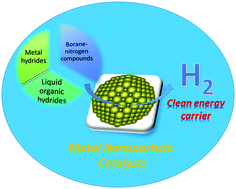Recent developments of nanocatalyzed liquid-phase hydrogen generation†
Abstract
Hydrogen is the most effective and sustainable carrier of clean energy, and liquid-phase hydrogen storage materials with high hydrogen content, reversibility and good dehydrogenation kinetics are promising in view of “hydrogen economy”. Efficient, low-cost, safe and selective hydrogen generation from chemical storage materials remains challenging, however. In this Review article, an overview of the recent achievements is provided, addressing the topic of nanocatalysis of hydrogen production from liquid-phase hydrogen storage materials including metal-boron hydrides, borane–nitrogen compounds, and liquid organic hydrides. The state-of-the-art catalysts range from high-performance nanocatalysts based on noble and non-noble metal nanoparticles (NPs) to emerging single-atom catalysts. Key aspects that are discussed include insights into the dehydrogenation mechanisms, regenerations from the spent liquid chemical hydrides, and tandem reactions using the in situ generated hydrogen. Finally, challenges, perspectives, and research directions for this area are envisaged.

- This article is part of the themed collection: Energy Frontiers: Hydrogen


 Please wait while we load your content...
Please wait while we load your content...